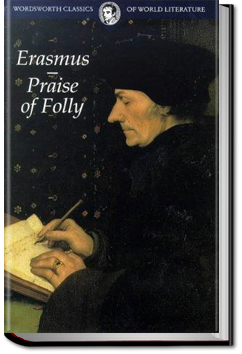The Praise of Folly is a satirical essay by Desiderius Erasmus of Rotterdam . It is considered one of the most influential works of literature in Western civilization and one of the catalysts of the Protestant Reformation.
It starts off with a satirical learned encomium after the manner of the Greek satirist Lucian, a piece of virtuoso foolery; it then takes a darker tone in a series of orations, as Folly praises self-deception and madness and moves to a satirical examination of pious but superstitious abuses of Catholic doctrine and corrupt practices in parts of the Roman Catholic Church—to which Erasmus was ever faithful—and the folly of pedants (including Erasmus himself). Erasmus had recently returned, disappointed, from Rome, where he had turned down offers of advancement in the curia, and Folly increasingly takes on Erasmus’ own chastising voice. The essay ends with a straightforward statement of Christian ideals.
be blind at, or deceived in the
vices of our friends, nay, to admire and esteem them for virtues, be not
at least the next degree to folly? What is it when one kisses his
mistress' freckle neck, another the wart on her nose? When a father shall
swear his squint-eyed child is more lovely than Venus? What is this, I
say, but mere folly? And so, perhaps you'll cry it is; and yet 'tis this
only that joins friends together and continues them so joined. I speak of
ordinary men, of whom none are born without their imperfections, and
happy is he that is pressed with the least: for among wise princes there
is either no friendship at all, or if there be, 'tis unpleasant and
reserved, and that too but among a very few 'twere a crime to say none.
For that the greatest part of mankind are fools, nay there is not anyone
that dotes not in many things; and friendship, you know, is seldom made
but among equals. And yet if it should so happen that there were a mutual
good will between them, it is in no wise firm nor very long lived; that
is to say, among such as are morose and more circumspect than needs, as
being eagle-sighted into his friends' faults, but so blear-eyed to their
own that they take not the least notice of the wallet that hangs behind
their own shoulders. Since then the nature of man is such that there is
scarce anyone to be found that is not subject to many errors, add to this
the great diversity of minds and studies, so many slips, oversights, and
chances of human life, and how is it possible there should be any true
friendship between those Argus, so much as one hour, were it not for that
which the Greeks excellently call euetheian? And you may render by
folly or good nature, choose you whether. But what? Is not the author and
parent of all our love, Cupid, as blind as a beetle? And as with him all
colors agree, so from him is it that everyone likes his own sweeter-kin
best, though never so ugly, and "that an old man dotes on his old wife,
and a boy on his g



---------------------------